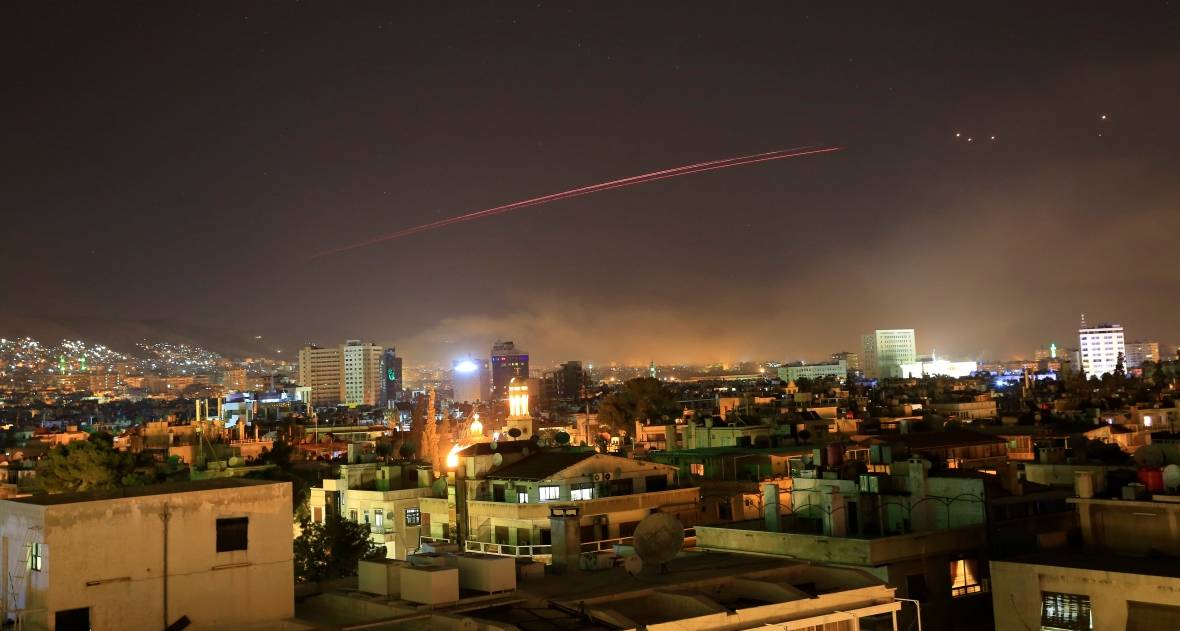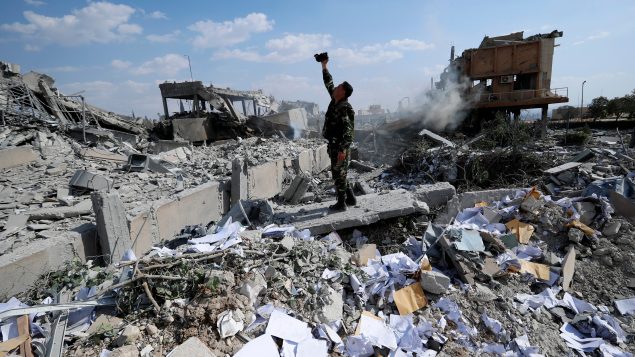Syrian air strikes early Saturday morning were not a surprise to Canada’s Prime Minister Trudeau.
“We were apprised in advance of the operation,” Trudeau told reporters at the end of his three-day visit to Peru, that included the 8th Summit of the Americas.
“We were very supportive. And there was no request for Canada to join as part of that operation.”
The United States, Britain and France dropped 105 cruise missiles on sites suspected of producing chemical weapons in Syria.

Damascus skies were lit up with anti-aircraft fire as the U.S. launched airstrikes against Syria, targeting different areas near the capital, early Saturday morning. (Hassan Ammar/AP)
The move was in response to the alleged chemical weapons attack in Douma, on the outskirts of Damascus in the first week of April.
U.S. President Donald Trump described the attacks as an “enormous success” and declared it ‘mission accomplished”.
Bessma Momani is a senior fellow at The Centre for International Governance Innovation (CIGI), and associate professor of political science at the University of Waterloo and the Balsillie School of International Affairs.
ListenShe describes the air attacks as a “symbolic message”. But she says there were a lot of things missing in this strike.
“Not going to be a game-changer in terms of capacity”
With “at least four to five days of deconfliction and communication between the Russians and the Americans to ensure that no Russian assets were harmed,” the element of surprise was missed. And,”this is really important to give the Russians an opportunity to save face and not have to retaliate with any measure,” Momani says.
Momani says “any real valuable assets that the Syrians had were probably moved into Russian air bases where they knew they weren’t going to be targeted.”
And not all of the chemical weapons facilities were hit, as some are in densely populated areas, Momani says.
“So in that respect it probably is not going to be a game-changer in terms of capacity” she says, “but certainly it probably put a dent in it.”
Meanwhile Syria is in chaos. After seven years of violence and destruction that erupted with the Arab Spring and the wave of protest that swept much of the Arab world at the end of 2010, the country is now fractured.
“The country in some places looks untouched, and in other places it is a complete war zone and completely decimated into rubble” Momani says.
“Assad himself noted that $400,000 billion dollars might be needed in reconstruction costs.” she notes adding that it’s a conservative estimate.
The big question for Momani now, is where the “red line” is at this point.
Former U.S. President Barack Obama invoked the proverbial “red line” vowing that the US would take direct military action against Syria if it used chemical weapons.
“Because this particular attack was a combination of sarin and chlorine whether or not they are now going to feel that chlorine is a new red line” Momani reflects.
“There are far more civilians killed through conventional weapons than there are through chemical weapons so in many ways drawing the red line along chemical weapons is arbitrary,” she says.
It is estimated over 400.000 people are missing or have died over the life of this conflict, and approximately 10,000 have been displaced.
Meanwhile in Canada on Saturday, many Syrian refugees donated blood in 10 cities across the country, as a way of demonstrating their gratitude for the opportunity to start new lives here.







For reasons beyond our control, and for an undetermined period of time, our comment section is now closed. However, our social networks remain open to your contributions.